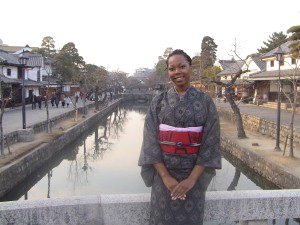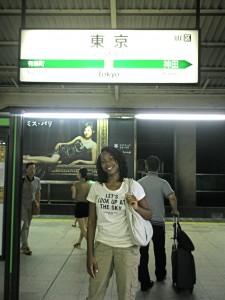Cuts short sightseeing to head back to U.S. early
by La Risa Lynch
Philadelphia native Elizabeth Dredden considers herself lucky to have left Tokyo, Japan when she did.
Dredden, 27, pondered staying in Tokyo a week longer to do some more sightseeing after her teaching gig ended. But Dredden wanted to get back home. She spent the last ten months teaching English to children and adults in a small rural town nine hours away from Tokyo. That decision may have saved her life.
“I definitely consider myself blessed” Dredden said. “I was in Tokyo for almost two weeks before the tsunami and earthquake hit.”
A week after Dredden landed in the U.S., a 9.0-magnitude earthquake rocked Japan triggering a tsunami that swallowed whole villages killing thousands in its wake last month. The disaster left nearly 13,000 dead with scores still missing. Two Americans were killed in the disaster according to news reports.
Aftershocks still rock Japan, including one on the anniversary of the March 11th quake. It is the second most powerful quake in a week. Still Japan continues to struggle to contain radiation oozing from the quake-damaged Fukushima nuclear power plant.
Japanese officials raised the crisis level of the radiation leak from a level five to a seven. That matches 1986 Chernobyl disaster when a reactor explosion sent radiation into the air. The ranking is the highest level on the international scale of nuclear accidents determined by the International Atomic Energy Association.
Though recovery efforts are underway, images of the disaster Dredden narrowly missed haunts her.
“When I first saw it, it was unreal for me,” Dredden recalled of the images newscasts still broadcast of the tsunami’s destruction. “It was kind of hard to believe I was just there. …It does not look like the Japan I was in.”
Reality sets in when Dredden speaks with the friends she made there and left behind. Damage is widespread, but its severity depends on where a town is located.
A friend living in Tokyo had minimal damage to his apartment while another friend in Mito, an area hit hard by the quake but spared by the crushing tsunami, left her apartment in ruins. There is a rush among many Americans working and living in Japan to get out.
“A lot of the people that I know in Japan are leaving now,” Dredden said. “They are telling me they wished they would have left when I did.”
The devastation, Dredden noted has turned a country known for order into one of chaos. Images of people waiting patiently in line for food, by all outward appearances, seem calm, but Dredden noted many of her Japanese friends paint a picture of uneasiness, especially for a country that routinely experiences earthquakes.
“They are very worried,” said Dreddren who experienced a few trembles while there, but nothing of this magnitude.
“I think that’s why, in a lot of the footage, you see that people are like: ‘Oh this is a big one,’” she explained. “They are thinking it is going to stop soon, but it kept going on and on and … and the next thing you know, buildings are falling.”
Travel abroad
While Dredden was thankful she left Japan when she did, she enjoyed her time there. But it was by chance she lucked upon a teaching position in the county.
Dredden was surfing the Internet looking for opportunities to travel abroad when she stumbled upon an advertisement to teach English in the farming town of Kutashiki, Japan.
She said Japan is hungry to learn English and to learn anything about American culture. That interest brings opportunities for Americans to teach there.
She also contends the interest in American culture comes from the fact that Japan is a very homogeneous country. She added American influences, from consumer products to music, can be found everywhere.
“They really don’t get to see a lot of outsiders,” Dredden said. “So any time anyone would see me, they would have a million questions about America.”
Dredden drew more attention, not because she is African-American, but because of her hair style.
“I have locs,” she said. “Almost every conversation ended with can I touch your hair.”
Dredden said the question was out of curiosity and not out of “anything negative.” However, she noted many Japanese believe the hairstyle was universal to all Americans. She noted they asked a white male American colleague could he do the same with his hair.
“They think that if one American does it, then all Americans do it,” Dredden explained. “There is no difference as far as race goes with them.”
Dredden thoughts go back to the efforts at normalcy the Japanese are trying to eke out from the disaster. Assistance, she said, is needed.
“I’m just asking of everyone to say a prayer, send any kind of help or do anything to devote to the cause,” Dredden said. “It’s really scary what’s happening to those people.”



Be the first to comment on "Luck saves Philly native from Japan quake"